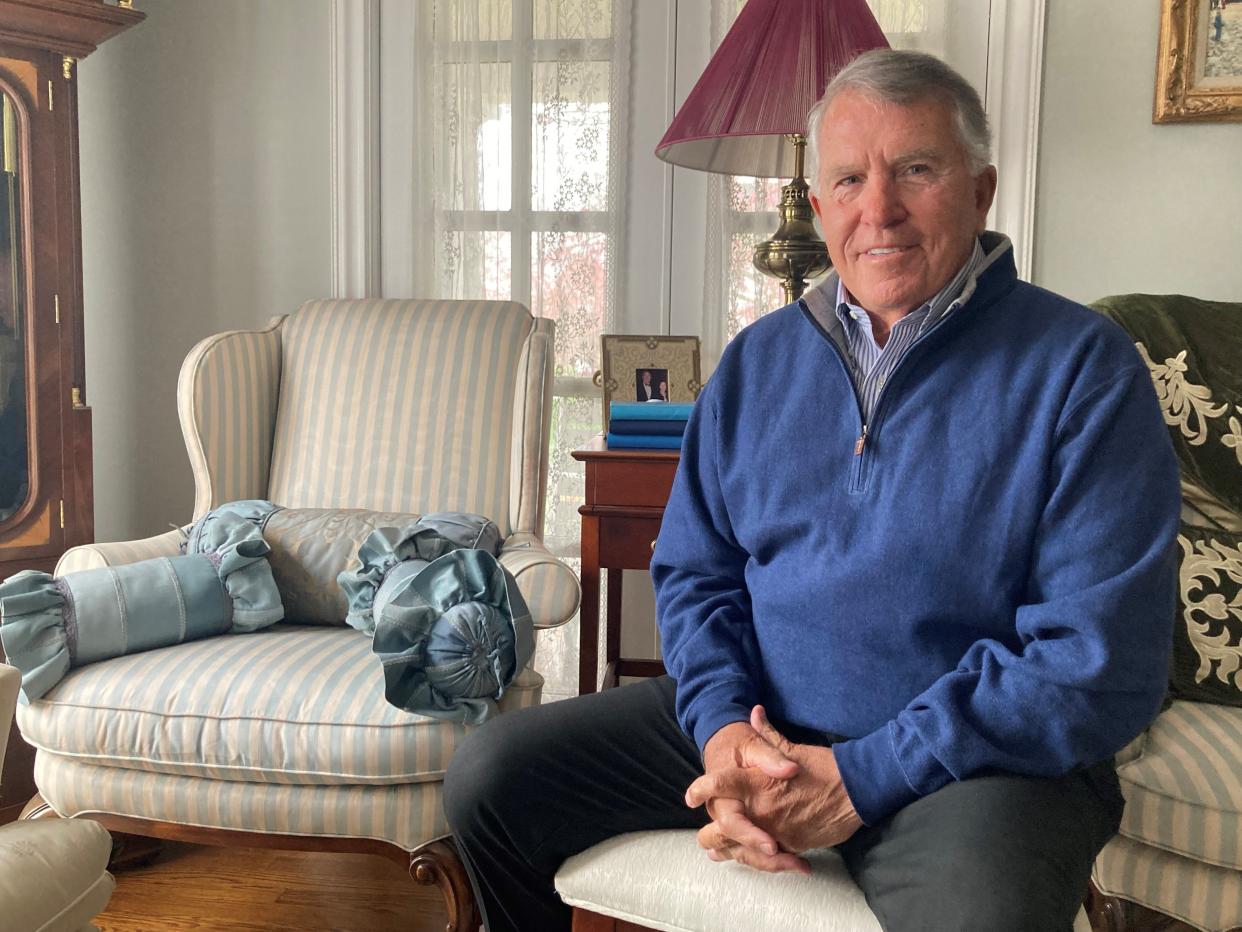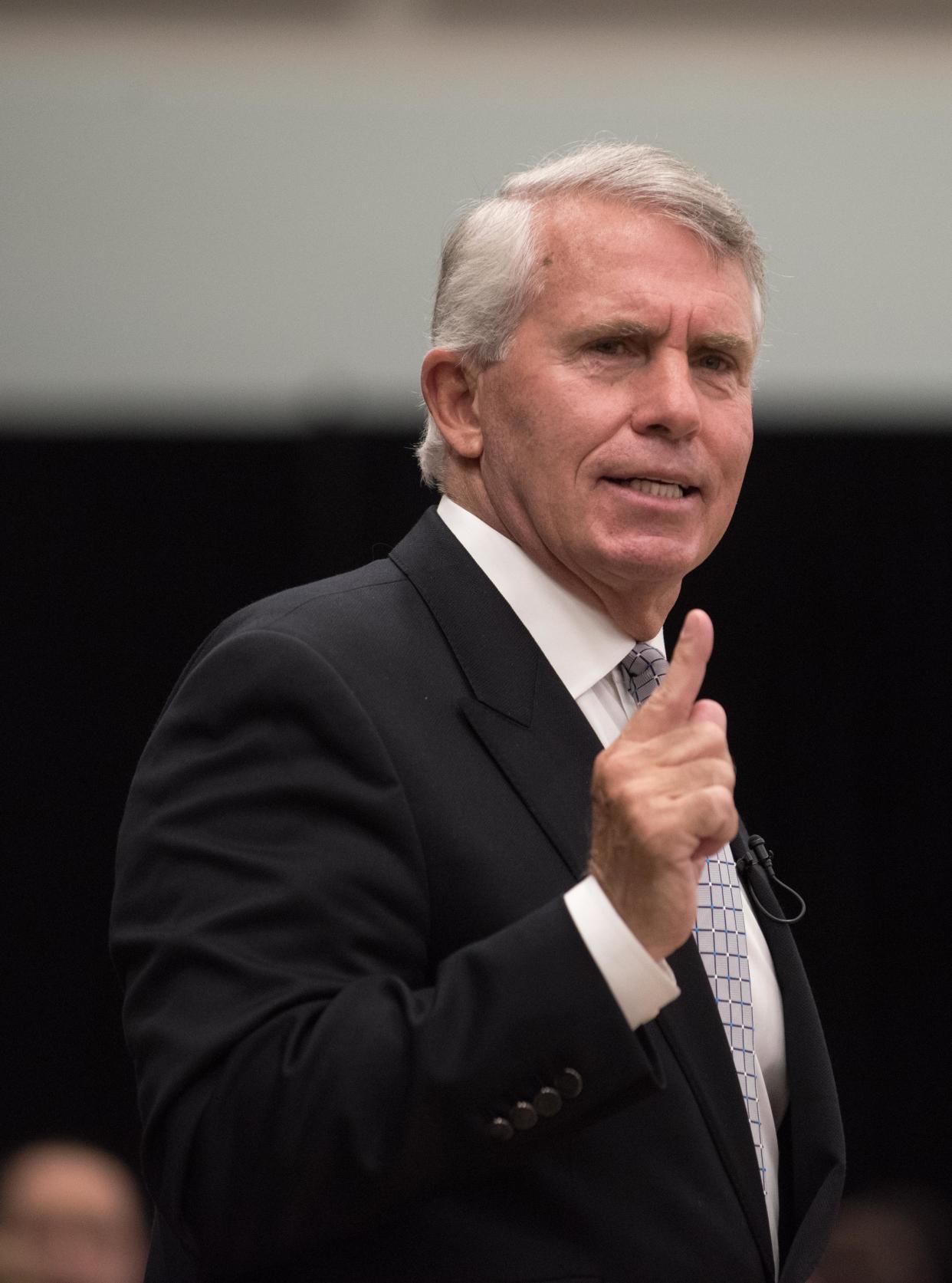'He just didn't get it': Spring Lake's Jack Ford covered O.J. Simpson trial, now teaches it

SPRING LAKE - Jack Ford teaches a course at Yale University, “Trials of the 20th Century,” that covers a dozen sensational court cases — including, of course, the O.J. Simpson murder trial in 1995.
On that one, Ford remains a foremost expert. The Point Pleasant native and longtime Spring Lake resident served as NBC’s chief legal correspondent during the spectacle. It came roaring back into public consciousness last week when Simpson died at age 76, but the young adults in Ford’s classroom didn’t quite grasp what the fuss was about.
“My students knew very little about it,” Ford said. “I had them ask their parents what they knew, and they were astonished at how their parents had watched some part of it. They don’t understand what a star he was.”
After they studied up on the gruesome deaths of his wife Nicole Brown Simpson and her friend Ron Goldman, Simpson’s subsequent arrest, and the nine-month murder trial that captivated the nation, Ford posed a question: How many think he was guilty?
“Just about every hand goes up,” he said. “Then they ask: How in the world did he get acquitted of this?”
This is one of those things where only someone who lived it — not a textbook, not a Google search — can give the full, nuanced answer.
“I have to explain to them: It’s function of time and place,” Ford said.
A timeline of O.J. Simpson's life: From the Heisman to white Bronco chase and murder trial
‘An aberration’ with consequences
Ford found himself at this flashpoint in criminal justice history after an up-from-the-bootstraps journey that started in Ocean County. He played football at both Point Pleasant Beach and Point Pleasant Borough high schools, earned a scholarship to Yale, played football there, and after obtaining a law degree became a prosecutor and prominent trial attorney.

Automotive history: What happened to white Ford Bronco in O.J. Simpson car chase? It ended up in crime museum
In 1991 he helped launch Court TV (now TruTV) as one of its original anchors, and in 1994 joined NBC reporting on legal matters for the Nightly News, The Today Show, and Dateline. In June of that year, when NBC cut into a Knicks-Rockets NBA Finals game to broadcast Simpson’s infamous White Bronco chase, it was Ford’s voice providing the analysis.
Like everyone else associated with the trial, Ford became instantly recognizable across the country.
“When I give speeches, invariably when I open the floor to questions the hands go up and the first thing they ask is, ‘What do you think: Did O.J. really do it?’” he said. “I say to people: I tried more than dozen murder cases as a prosecutor, including five death penalty cases, and I’ve never seen as much evidence against somebody as we saw against O.J. But at the time it wasn’t just about evidence. It was about so much more, which is why I say to people: That was not indicative of the justice system; it was an aberration.”
Ford tries to impress upon his students the enormity of Simpson’s celebrity: college and pro football superstar, sports broadcaster, movie actor, commercial pitchman — a ubiquitous presence for many years on American televisions.
Then there was the context: “Los Angeles at the time, the image the LAPD had (the Los Angeles police department was beset by a cloud of racial bias), the fact that it was just a few years after Rodney King and the riots.”
And the aftermath: The trial's repercussions still reverberate.
“One of the problems with the O.J. trial is people walked away distrustful of the justice system because of the way it looked,” he said.
On the flip side, the case cast an unprecedented spotlight on the scourge of domestic violence.
“Numerous times Nicole called 911, and only one time was there a minor offense charged,” Ford said. “(Police) were like, ‘O.J., come on, you can’t do this.' And O.J. was like, ‘OK it won’t happen again.’
“Police now have to do something. That’s a consequence of it.”
‘He was living in a bubble’
Despite the circus atmosphere surrounding the Simpson trial (150 million people watched the verdict's delivery), Ford remains a firm supporter of cameras in the courtroom “because the justice system is the least understood of our three branches,” he said. “Everybody thinks our system is Judge Judy.”
The issue resonates today as former president Donald Trump’s first criminal trial gets underway in New York — without TV cameras.
“There so much turmoil and confusion surrounding this trial, and the remedy is to let as many journalists in as possible and put a camera in there,” Ford said.
He’ll also be watching news coverage closely for objectivity, or lack thereof. As a legal analyst, he never offered an on-air opinion about Simpson’s culpability — although he was pressed to do so by anchor Bryant Gumbel, talk-show host Larry King and others.

“As soon as I do that, I’ve lost half the viewers,” he told Gumbel.
He did get to know the trial’s major players personally, but tried to keep professional distance. Immediately after the verdict he lined up an exclusive interview with Simpson, only to have it scuttled when he refused to have his questions vetted in advance by Simpson’s lawyers.
They didn’t want him asking the obvious one: Did you do it?
By omitting that, “I would look like a complete idiot,” Ford said.
When Simpson was arrested in 2007 for robbing a memorabilia dealer, Ford had a bewildering private conversation with him.
“He’d completely convinced himself that he was innocent of the killings,” Ford said. “He just didn’t get it, because he still had the adulation. Wherever he went people asked him for autographs. He was living in a bubble. It’s interesting how many people in a public sphere think, 'The rules don’t really apply to me.' O.J. was one of them.”
'Died without penance': Family of Ronald Goldman speaks out after O.J. Simpson's death
The media’s handling of Simpson’s death, Ford said, was missing the same context that his students lacked.
“Not much of the coverage focused on how the verdict could have happened, why it could have happened, which is because of his celebrity,” he said. “If you’re going to tell the O.J. story, you can’t tell it without focusing on what an enormous star he was. That’s what I try to get my students to understand.”
A final story hammers the point home. Sometime after the trial, Ford was staying in a hotel that caught fire. He helped two older women descend the stairs, carrying their luggage, and when they got out onto the street a first responder approached him with a question.
It wasn’t about the fire, the conditions in the hotel, or how Ford or the two women were faring.
“Jack, so what do you think?” Ford recalled the emergency worker saying. “Did O.J. do it or not?”
Jerry Carino is community columnist for the Asbury Park Press, focusing on the Jersey Shore’s interesting people, inspiring stories and pressing issues. Contact him at jcarino@gannettnj.com.
This article originally appeared on Asbury Park Press: O.J. Simpson trial made Jack Ford famous. Now he teaches it
